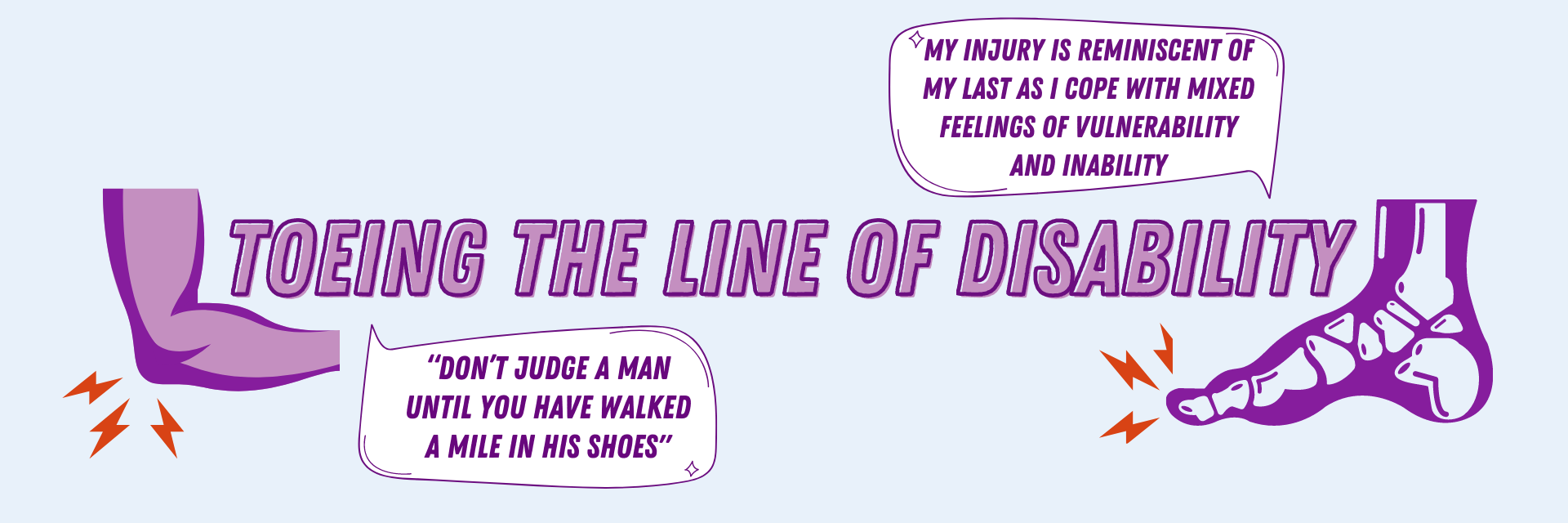
By: Austin Clack
Since childhood the well known saying, “Don’t judge a man until you have walked a mile in his shoes” has been hammered into my moral judgement by teachers and family. I had always taken this to mean that you cannot form an opinion of someone without trying to understand their perspective, whether you align with their views or not. However, recently I’ve come to realize that the lesson behind the saying can at the same time take on a much more physical interpretation.
Working with the DCP, my exposure to people with disabilities and disability culture has encouraged my perspective to broaden exponentially. Playing wheelchair basketball for the first time was an eye opening experience. I walked into the gym fully confident I could hold my own, I’d played basketball since I was a toddler so what was going to be so hard about simply sitting down to play? An hour and a half later, feeling somewhat defeated, I left the gym humbled. However, more important than appreciating the skill and practice wheelchair basketball requires, standing up out of the chair afforded me a new perspective that while I may take on this mode of mobility to play a game, the permanence remains for others I was playing with. My experience that day gave me pause and caused me to reflect on other times I may have been able to sympathize with some aspects of being disabled. Injuries in particular, while temporary, have placed me in the shoes of someone whose permanent disability causes struggle with an ableist society.
I’ve had my fair share of injuries throughout the years. Being an athlete while also lanky and relatively uncoordinated, I all too often sprained an ankle or strained a muscle and found myself sidelined “taking it easy” for a couple of weeks to recover. My one severe injury of my basketball days took me out of action for 6 months and required reconstructive surgery of my elbow. I can remember the feeling of suddenly being removed from my normal day-to-day and instead desperately trying to find new ways of keeping myself occupied. Aside from the boredom, taking care of myself became a challenge. I needed help with the simplest of tasks, even relying on my dad to help me get dressed and take showers. Suddenly, schoolwork became difficult as well. I strenuously did my homework using my left hand instead of my right and I required a friend to help me take notes in class. For the first time in my life I felt dependent and separated from the norm. It’s been four years since then but the experience of impairment and the isolation that resulted still sits with me.
More recently, I have once again injured myself, this time cutting the bottom of my foot so badly I exposed the bone on two of my toes and required stitches. While months of rehabilitation won’t be required this time, my injury is reminiscent of my last as I cope with mixed feelings of vulnerability and inability. I hobble around my apartment, take five minutes to reach the top of a small flight of stairs, and spend my days scrolling through social media looking at pictures of my friends enjoying themselves at the beach. No, my injury is not permanent, I’ll be back to my old self in a matter of weeks, however, I’ve come to recognize that these instances in which I hurt myself and am forced to remove myself from my normal routine allow me to sympathize with some aspects of being disabled. I in no way want to equate a temporary injury with a life long disability, doing so would be inappropriate and out of touch, what I do believe is that any able bodied person is obligated to step into the shoes of someone disabled when the opportunity arises.
My own home suddenly becoming inaccessible gave me a new perspective and allowed me to realize a much more personal perspective of the concept of inherent inaccessibility. Living in hilly Westwood and going to UCLA, the acronym University of Calves, Legs, and A** is definitely fitting. For most, the incline of our campus is merely an inconvenience or even a convenient workout. However, the nature of the place we live and go to school and work at forces others to strategize every day how to get around. Finding an apartment, choosing a route to class or getting groceries means a literal uphill battle for someone with a physical disability, something I too have been forced to do while my foot heals. While terrain alone strains a chair user enough, the architectural barriers the gen pop overlooks every day make navigating public spaces incredibly difficult if not impossible. This is why we must remind ourselves of that saying. While my injuries have allowed me to take that walk in another’s shoes, hurting myself was not necessary a prerequisite. We all can and should do some self reflection when it comes to the way in which we interact with our environment, doing so has allowed me to view my own day to day routine in a different light and recognize the uneven nature of accessibility in Westwood. Unfortunately, this extends past just Los Angeles, as disabled people cope with living in a world fundamentally structured not in their favor. However, when those who don’t share in this struggle recognize its existence and take steps to be allies to those that do, shared perspective and the change that follows is made possible.
Originally Posted: 21 July 2020

